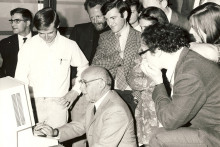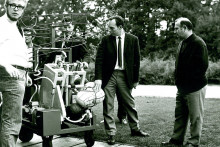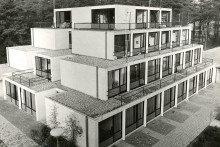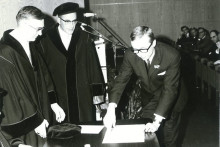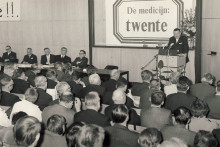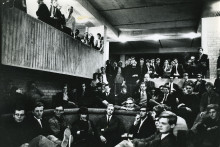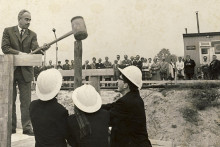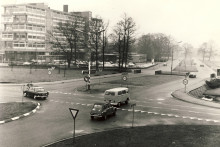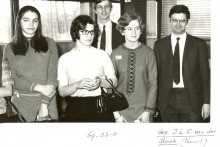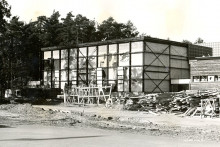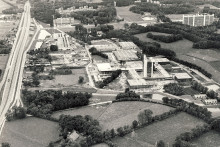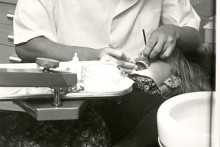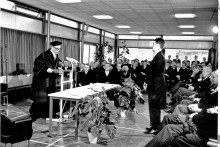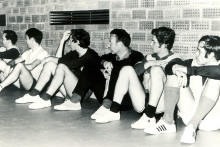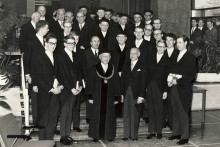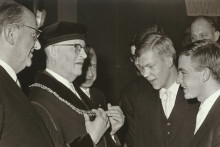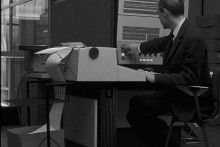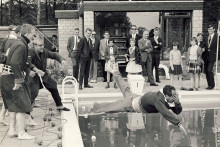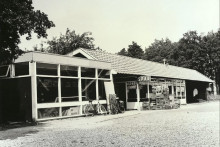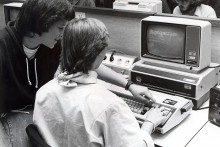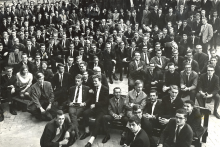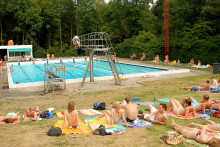1968. Paris. Students in France are taking to the streets en masse to protest the outdated education system. Before long, demonstrations have turned into a battle with the police. Fights break out - serious ones. Workers express their solidarity and call a grève générale, bringing the country to a standstill. Across Paris, revolution is in the air. The student protests stop being about just education reforms and grow into a rebellion against the establishment.
In the sixties and seventies, Harry Fekkers studied applied mathematics at the Twente Technological University of Applied Sciences. When he heard about the protests in Paris, he didn’t have to think twice. That same month he and his lecturer and mentor Erik Bolle drove to the French capital. One of their experiences there was attending a speech by the French writer and philosopher Daniël Cohn-Bendit. ‘Til we had to make a break for it, that is: the gendarmerie was on its way.’
There is no doubt that the May ’68 protests were an historic event. While the revolution didn’t immediately depose those in power (Charles de Gaulle, the right-wing conservative president and establishment figurehead, remained in power for another year), it was the start of a social revolution which spread across Europe like wildfire.

Introduction of study year 1967/1968.
Karl Marx University
Students took the fight to the antiquated power structures in higher education in the Netherlands, too. The Maagdenhuis - the administrative building of the University of Amsterdam - was occupied by students in 1969 and became the symbol of the country’s student protests, which demanded a say in how the university was run. Shortly before the Maagdenhuis was occupied, students in the province of Brabant occupied the Catholic University Tilburg, renaming it the Karl Marx University. In the Netherlands, too, students wanted to talk about their own education.
It didn’t take long for the young Fekkers to get involved in that either. ‘Twente, where I studied, held a student parliament where we discussed the occupation and the Karl Marx University. A motion was passed at the event expressing solidarity with the students in Tilburg. That same night we got into an Opel Kadett and drove to Brabant to present the motion to our comrades in Tilburg.’

Aerial picture of the campus, 1969.
Frat boys and lefties
When Fekkers came to Twente to study in 1967, relationships between the university staff and students were still quite formal, though they were still closer at this brand-new university of applied sciences than they were at more traditional universities. The hierarchy on campus wasn’t so ingrained. ‘It’s not like we were on first-name terms, though. Even in Twente, the culture only became really egalitarian in the late sixties.’ This is just one example of the turbulent sixties and its rebellious generation - rebellion which, incidentally, started quite late.
'We ordered a huge pot of nasi from the Chinese restaurant in Enschede and we gave it out to the other students for free'
Fekkers moved to live on the campus with all of the other students, as was compulsory at the time. His address? The notorious Calslaan 55. ‘The house was infamous,’ he says. ‘That’s where the leftie students livedm. Our neighbours were more like frat boys. They celebrated Queen’s Day very enthusiastically on 31 April, with oranjebitter and sack races. We joined in on the fun, too. At midnight, though, the celebrations changed, as 1 May is of course May Day. As left-wing lads, we had solidarity with the workers. At midnight the oranjebitter disappeared and the red wine came out. The frat boys didn’t mind, we just kept the party going til the wee hours.’
The first ‘real’ student direct action on campus was the student restaurant strike in 1968, and Fekkers still remembers it well. The reasons for it were simple: meals in the student restaurant where students were required to eat weren’t nice, and so action was needed. ‘We barricaded the entrance so that nobody could get in. We ordered a huge pot of nasi from the Chinese restaurant in Enschede and we gave it out to the other students for free.’ The protest was effective. The administration asked the campus doctor to assess the quality of the food. ‘Meals got a little better after that, which was great.’

Students put the old library bike to good use.
Occupation
While the Maagdenhuis occupation and Karl Marx University were fuelling the fire in the rest of the Netherlands, things were still relatively calm in Twente in 1969. It was only in 1970 that students from the radical Student Union Movement - including Harry Fekkers - occupied the administrative pavilion overnight on 21 - 22 January. This didn’t last long, though: in the afternoon of 22 January, the police cleared the building.
'A progressive wind blew through the University Council for many years'
The occupation gave rise to an experimental forerunner to the University Council, says Fekkers. The experiment was a sign of things to come. In the early 70’s the Hague responded to the nationwide student protests. The University Administration (Reform) Act (Wet universitaire bestuurshervorming) introduced a five-member executive board for the Twente Technological University of Applied Sciences and all other education institutions, as well as a University Council elected by the entire campus.
Fekkers cofounded the KPS (Kiesvereniging Progressieve Samenwerking), the party which went on to take charge of the University Council alongside the more conservative DD (Democraten Drienerlo) for many years. Erik Bolle, who went to Paris with Fekkers at the end of the 60’s, also became a prominent figure in the KPS. ‘It was the longest-lived political organisation at the university,’ recalls Fekkers. ‘It existed for a quarter of a century. The KPS was mostly made up of left-wing students and staff. A progressive wind blew through the University Council for many years.’
'We wanted a different kind of education, greater freedom of choice, more trust, and more say over where money went. And to a large extent, that’s what we got'
Man the barricades
The wave of democratising higher education began with the student protests in Paris in the late sixties. Students demanded major changes to the outdated education system. The movement was emulated in the Netherlands. The University Administration (Reform) Act brought in the reforms required. This law empowered students in higher education. ‘We wanted a different kind of education, greater freedom of choice, more trust, and more say over where money went,’ says Fekkers. ‘And to a large extent, that’s what we got.’
Fekkers believes today’s students have to get back to manning the barricades. ‘Priorities are completely different now, though. We were focused on our individual needs, but now there are urgent global matters at stae. What is our approach to wellbeing going to be? What’s the best way to combat fake news? And how can we create a circular economy? These are the big issues of our time.’

The Bastille, with the Vrijhof in construction on the right.


